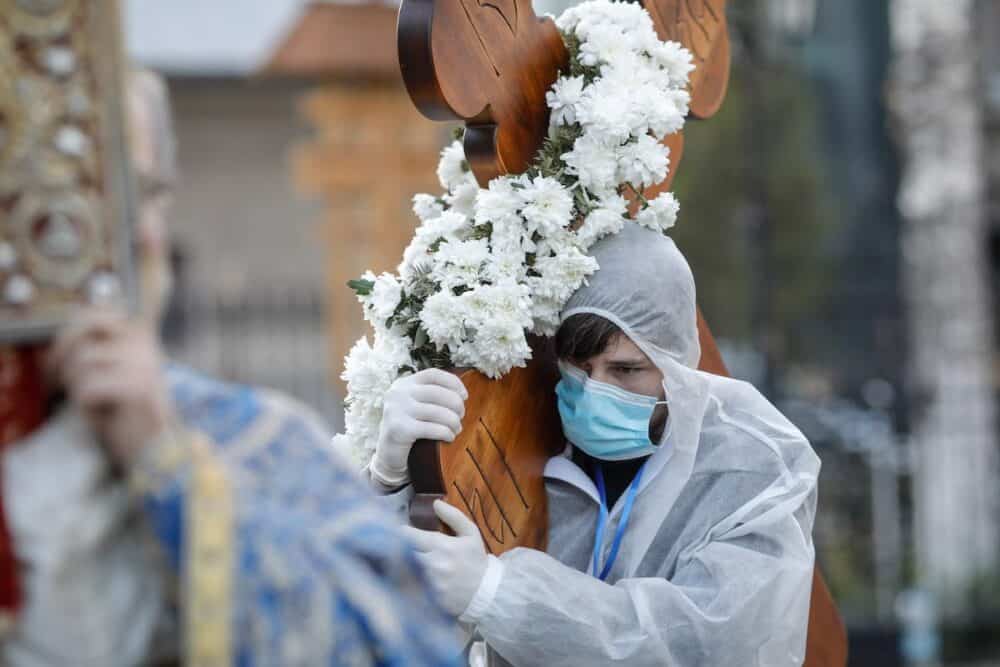July, 2022. On a Monday morning, the European Commissioner for Health sends out a call on the 27 Member States. The Commissioner urges them to use the summer period in order to prepare for a new wave of CoViD-19 infections in autumn and winter. The population simply doesn’t want to hear any more about masks, isolation, quarantine.
Romania registers about 5,000 cases of CoViD-19 per day. Yesterday, 24th of July, five people died from this disease. The air feels hard to breathe. Crises start to overlap. Ukraine has been at war for over 150 days now. Europe has started to restrict energy consumption, inflation has soared, people fear the economic crisis.
Watch the video debate on the pandemic’s psychological effects with Alexandru Stermin, biologist, explorer, psychotherapist; Liana Don, psychiatrist, psychotherapist; Marius Ungureanu, public health policies expert.
As I entered the Retirement Home “Casa Teodora”, I was the first stranger to cross its threshold after a year of total isolation. This retirement home had been the scene of a drama. More than 110 of its residents fell ill with CoViD-19, including the doctor who ran the hospital. Eleven of them died.
The others went through a nightmare, and coming back to life was not easy at all. Physically weaker, more frightened of death and more affected by loneliness, they found out that they could not escape that nightmare without aid. They turned then to a team of psychologists from the Faculty of Psychology at Babeș-Bolyai University in Cluj-Napoca.
Read also: Europe under nuclear threat. Is Russia becoming a terrorist state?
„My father died there in the first year of the pandemic, but not from CoViD. I’m convinced it was the loneliness,” says his daughter Nicoleta. „He was used to our visits, which, in quarantine, were forbidden. His health deteriorated rapidly, and with all the support of the head doctor who stayed with him all the time, he collapsed,” she explains.
This summer, Georg Folberth was buried in his home village in Transylvania. They only buried his ashes. Georg has been prisoner in a forced labor camp in Russia. When he returned from there in 1949, he had “48 kilos and his ears were transparent”.
Exhausted by work and hunger, tortured by nightmares, he barely recovered, but he didn’t die. A few years later he emigrated to Germany with his fellow Saxons. But he died now, during the years of the pandemic crisis, at the age of 97, in a home for elderly people.
„Loneliness, that’s what took him down!” his brother-in-law said at the funeral.
Reality check: what we do when we find out we can’t control everything
Studies reveal that the elderly and the young have experienced the restrictions and isolation imposed by the pandemic most strongly.
A 2021 „Ada” analysis shows that in studies focusing on eight countries, the average proportion of assessments suggesting depression in the under-18 age group increased from 7.5% in March 2020 to 12.6% in March 2021. That’s a 67% increase.
At the end of the academic year, in 2020, the graduation ceremony of a faculty in Cluj took place in the city’s stadium. Thousands of students, professors and parents, after being checked that they were vaccinated, were able to attend the event. Everyone, absolutely everyone who spoke at the graduation ceremony, students, professors, guests, spoke of nothing but the joy of seeing each other again.
They did not mention anything about the future or how they will move forward in their profession, only about the sufferings and frustrations of isolation during the two years of pandemic and the joy of being reunited. The pandemic had held them captive.
A psychology student, volunteer at the Suicide prevention Helpline, worked more than 15 nights of on-call duty throughout the pandemic crisis. He testifies how, night after night, ten to twelve people would call for help. Most of them were young. During the pandemic, some were left completely alone and others had long-standing mental disorders and the pandemic interrupted their access to psychotherapy.
Most young people have complained that they are lonely, he says, and this remains a problem. In his opinion, a solution to ease their forced loneliness would be “to focus more on the quality of relationships than on their quantity, to adopt solitary activities because we cannot be a pleasant company for others if we are not one for ourselves”.
„Look not at obstacles, but at opportunities”
When biologist Alexander Stermin published a text at the very beginning of the pandemic explaining what a virus is and how viruses have contributed over billions of years to human evolution, the number of readers exploded.
People needed information, they needed science. They needed to identify the unknown enemy. To understand the danger so they can accept it more easily. During this time, the young biologist also took training courses in psychotherapy.
Alexander Stermin says that psychotherapy not only trained him professionally in a field he is passionate about, but also helped him personally to overcome the restrictions of the pandemic.
Forced to give up his scientific exploratory journeys – he had planned trips to the jungle, northern reservations and partner universities – Alexander Stermin discovered at first hand how to escape from quarantine without leaving the house, how to conquer space and time using modern technology.
He confesses that he got closer to his students, talking to them from a distance, because the distance and the extreme experiences they were going through made them communicate more honestly, more deeply, more meaningfully. The same happened with friends and professors, colleagues from all over the world.
Now, returning from the Galapagos Islands, where he studied the adaptation of living things to the environment, he believes that what we humans have lost over time is flexibility: “We created a safe space for ourselves, got adapted to it, and entered into a kind of lassitude that decreased our flexibility. We have fallen into a kind of complacency and have lost the ability to adapt. Flexibility, that’s what I think we’ve lost and we need to get it back.”
„The number of patients has doubled and the effects of the crisis are just emerging”
A WHO report shows more than 76 million new cases of anxiety disorders in 2020 compared to 2019. And over 53 million cases of depression. We all had to adapt to a new, completely different lifestyle which resembled to dystopian scenarios more than to real life as we knew it. Changes have been sudden and radical. Some of us have held up better, others less so.
And “the effects of the crisis on the psyche”, says Liana Don, “are just emerging”.
Liana Don is a psychiatrist and psychotherapist. She estimates that during the pandemic, the number of patients seeking her and her colleagues’ advice has doubled.
The causes are multiple, but she notes that the effects of some restrictions on the population have a deeper cause: “Our inner conflict, our greatest conflict, even philosophically, is between freedom and safety. When you have freedom, you want to be safe.
When you are safe, you want freedom because you find safety boring. And then, these notions need to be re-conceptualized in terms of existence. For example, we can’t have an anarchic freedom where we do whatever we want in spite of everyone else.”
Read also: Is Russia a state that encourages acts of terrorism?
The pandemic has changed the way we relate to reality
However, what didn’t change. Psychiatrist Gabriel Diaconu believes that not only we are not better prepared for the upcoming wave of infections, but we also tend to avoid any reference to CoViD-19, disease, mask, pandemic, isolation, quarantine, hospital, an effect of the frustration felt during restrictions.
“As for people’s emotional distress”, says Diaconu, „it has been very badly dealt with by the governing authorities. The paternalistic attitude dominated and there was very little empathy.”
Experts make proposals, but nobody listens!
Marius Ungureanu, an expert in Health Policies, researcher at “Babeș-Bolyai” University, points out that the results of their studies have resulted in recommendations, which usually have the same fate: „They are not taken into account by those who should, the policy makers!”.
One big concern raised by almost all the experts we spoke to is the authorities’ lack of proper communication with the public in crisis situations. As well as the lack of medical literacy.
Psychologist Simona Stefan wonders: “Why weren’t psychologists asked to join the government’s communications team? And not just any psychologists, but those with expertise validated by the community of professional psychologists”.
And a diagnosis: inconsistency!
The conclusions of our discussions with experts on these topics indicate that the effects of the pandemic on the population, although visible, are just emerging. And research results should be taken into account very seriously in the post-pandemic or inter-pandemic period.
A psychological support line, opened at the Faculty of Psychology in Cluj with the support of the Ministry of Health, was endorsed by the authorities only for a short period of time.
“It was a matter of inconsistency” as psychologist Simona Ștefan, lecturer at the Faculty of Psychology of Babeș-Bolyai University says.
What do we have to do?
We, as individuals, and governments as well need to be aware of the possible long-term psychological effects of forced isolation. If we can self-educate in a more open spirit, more flexible towards the reality that can surprise us, politicians must allocate enough resources to the health system and the society to counteract these effects.
Follow PressHUB also on Google News!







